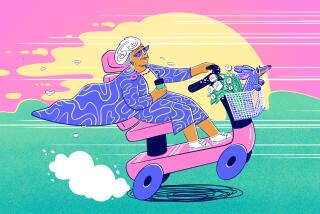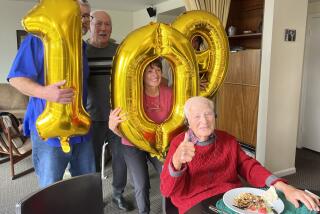Gray Panthers’ Maggie Kuhn Still on the Prowl at 83
- Share via
CHICAGO — “The older you get, the more outrageous you can be because you have nothing to lose,” Maggie Kuhn chirps.
At 83, the frail-looking founder of the Gray Panthers is no stranger to outrage.
“I refuse to accept the gullibility of the American people who swallow that garbage,” she declares, referring to the recent presidential election.
As she bangs the podium at the seventh Biennial Gray Panther Convention, her glasses slide toward the end of her nose, and her slender fingers appear twisted by chronic arthritis.
Fewer than 200 Gray Panthers have come to Chicago, and their 4 days at the Sheraton O’Hare Hotel will pass without a single line being written about them in either local newspaper. Undeterred, Kuhn stands before her faithful, once more keeping the torch of “activism among the aging” burning through a conservative time.
It was a torch she originally lit in 1971 after her employer, the Presbyterian Church, forced her into retirement at age 65. In 1973, she merged the Panthers with a similar fledgling group founded by Ralph Nader. These days, the Panthers claim a respectable membership of 80,000 in 80 national chapters, plus a Tokyo chapter, but their influence pales in comparison to other senior organizations.
Passion overcomes the frailty in her voice when she speaks of her causes--national health care, intergenerational housing and cutting the defense budget. She is disgusted with the recent campaign because “the bread-and-butter issues which are so dear to us--both young and old--were simply not addressed.”
The top issue the Panthers hope to tackle as George Bush takes office is national health insurance. Kuhn stands in front of a large banner reading, “Health care is a human right, not a privilege.”
There is nothing “kind and gentle” she says, “about a country where 38 million people are without health insurance, while in the past 8 years the nation has spent $2 trillion on defense--$21,000 per family.”
She pauses for some unabashed swipes at Ronald Reagan. “At home I have a doormat with Ronnie’s face on it, and I am proud to say that after all these years it is quite threadbare. Yet, I still get great satisfaction when I see my two cats, Emily and Charlotte Bronte, sitting with their fannies on it.”
A lifelong activist who spent much of her career as one of two whites in the Presbyterian Church’s civil rights department, Kuhn traditionally has had little patience with political convention. And she shows no sign of developing it now. In the first 2 minutes of her talk, she has uttered the L-word three or four times as confidently as a pianist hitting middle-C. In fact, she doesn’t come up for air until she’s touched on the R-word-- radical --a couple of times as well.
In an interview following her address, she appears ambitious and hopeful about her work, yet pragmatic about being 83 and in less than excellent health. Never married, Kuhn declares with great delight “how lucky I was to have so many wonderful affairs.”
Now at work on her second book, an autobiography that promises to be as much social history as personal story, she will also chair a series of symposiums in five cities next year on one of her favorite topics: intergenerational shared housing.
For 25 years, Kuhn has shared her five-bedroom home in Philadelphia’s Germantown with a series of house mates, many of whom are decades younger than she. She bought the house next door as headquarters for an arm of the Panthers called the Shared Housing Resource Center.
The Panthers have spread the idea of shared housing throughout the country, she says, and now mortgage banks are seizing upon it as a way to preserve housing stock, maintain neighborhoods and attract young people who are still a few years away from purchasing their first home.
Kuhn has not yet named a successor but did establish the Maggie Kuhn Endowment Fund to provide the Panthers with a financial cushion after “I am no longer there to personally sign the (fund-raising) letters which account for a large percentage of our income.”
Kuhn’s greatest legacy, however, is no doubt the incomparably restless attitude she has brought to the field of aging--which has perhaps not caught on in the senior-citizen communities of the Sunbelt that she calls “dubious social experiments” and “playpens for wrinkled babies.”
“We live in an age of tumult and terror,” she declares, “and I don’t want to cater to the idea that now is the time to play. We are the tribal elders, concerned about the tribe’s survival. Our job is to secure the future for the young. To that end, we are the ones who can afford to take risks. We have nothing to lose.”
More to Read
Get the L.A. Times Politics newsletter
Deeply reported insights into legislation, politics and policy from Sacramento, Washington and beyond. In your inbox twice per week.
You may occasionally receive promotional content from the Los Angeles Times.










